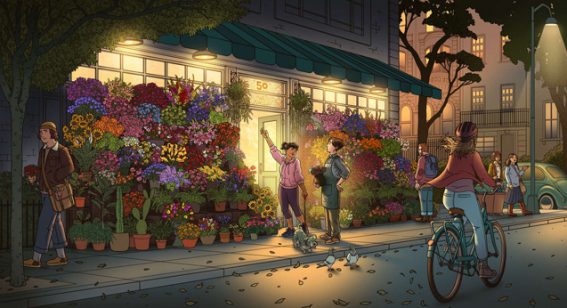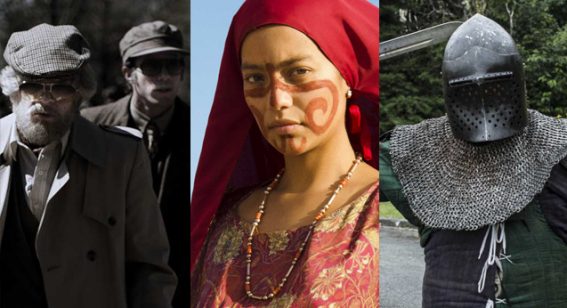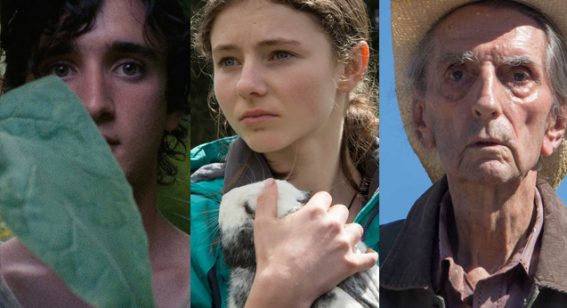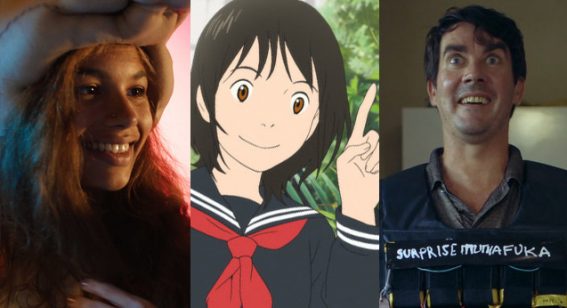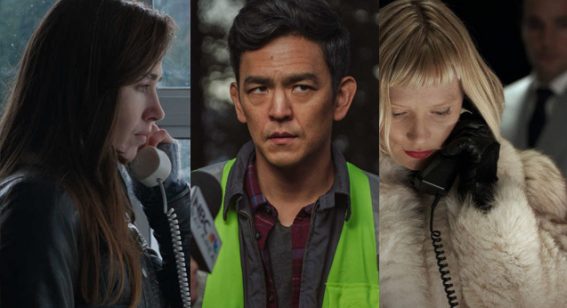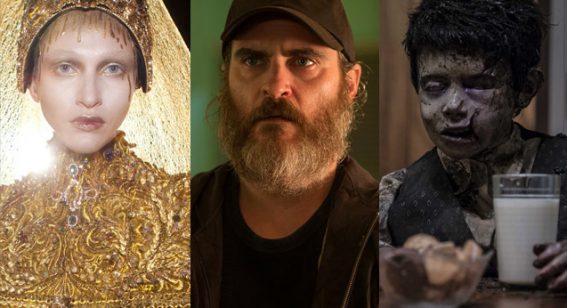NZIFF 2018 mini-reviews (D to G)
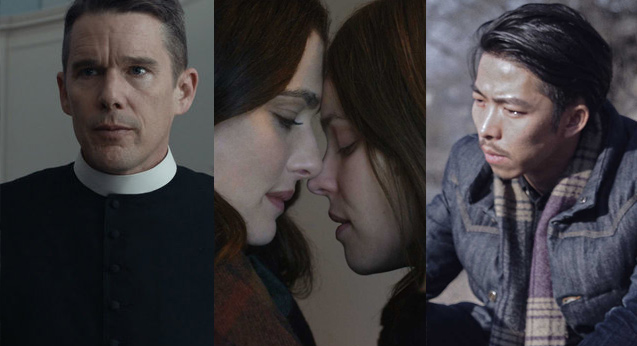
Flicks has sent its mighty writers all over the Auckland section of the New Zealand International Film Festival. Here are the films we’ve seen and what we’ve thought of them. (This page is updated daily-ish.)
Desert Hearts
Desert Hearts is a beautifully photographed lesbian love story set in the hot Nevada desert, with the most thoughtful costuming of any film I’ve seen at the festival thus far. The sentimentality of the 80s crossfades never take away from the delight of the story, not to mention the dialogue is a treat. At a runtime of just 91 minutes, this film is a short, sweet delight that breaks up the festival’s heavier offerings. -AMANDA JANE ROBINSON
The Devil We Know
Things I have learned at NZIFF 2018 #47: You, me and everyone we know almost certainly have a birth defect-causing chemical from Teflon in our blood. DuPont poisoned their workers, the town that housed their factories, and the entire world, as detailed in this terrifying account of corporate greed and lack of accountability. Try cooking dinner after this exposé, I dare you. -STEVE NEWALL
Diamantino
A beautifully batshit take on the rise of New Fascism in Europe, Diamantino’s titular footballer is delivered with such guileless grace that the film could have afforded to take its surrealism up a notch. Instead, mired by moments of Mike Myers-esque misfire, we have a workable satire that suggests, not unwisely, that the future of _all_ borders (national, gendered, sexual) must be fluid. -SARAH THOMSON
Strong candidate for delightfully dimmest character in NZIFF 2018 early on, the titular Diamantino is Portugal’s star footballer with not much going on upstairs – which makes him ripe for manipulation in fronting an anti-EU (Prexit?) campaign even while confusing racists by adopting a refugee. This doesn’t begin to describe the farce on offer in a film overflowing with ridiculous performances, surreal visuals (which don’t always live up to the filmmakers’ aspirations), and queer sci-fi/romance. Plenty to enjoy, but everything-and-the-kitchen-sink approach makes for hit-and-miss movie. Carloto Cotta as the Ronaldo-like Diamantino, though – hilarious. -STEVE NEWALL
Disobedience
Forbidden love, religious dogma, institutionalised sexism: not exactly topics that are underserved by cinema. But while you might expect Disobedience to play like by-the-numbers festival fare, it rises above that mainly through subtlety, and more importantly, empathy. The three leads are all fantastic, particularly McAdams’ repressed housewife, and while she’s painted as hugely sympathetic, the film admirably refrains from demonising her husband or the Jewish faith she was born into. There is one hoary cliche in the film (which I won’t spoil as it’s near the end), but aside from that Disobedience is refreshingly free from histrionics, preferring to patiently dig into its characters and uncover some genuine emotion. -TONY STAMP
Aside from being set in the world of orthodox Judaism, there’s not a lot that makes this tale of a love triangle very interesting. Romantic dramas work best if you click with the characters involved and here, I didn’t, despite the great direction and flawless performances. This opinion appears to be in the minority, but Disobedience is underwhelming. -DANIEL RUTLEDGE
In Sebastián Leilo’s first English language feature, Rachel Weiss and Rachel McAdams are equally compelling as two women stirring a long-buried intimacy. Tonally, the film was lighter than anticipated, if a little unsure of itself. While the incredible visual potential of the material inherent to Orthodox Judaism went largely under-utilised, the sensuality between the characters and the specificities of the script made for an enjoyable, competent film. -AMANDA JANE ROBINSON
Steaming hot same sex scenes (some debate about the spitting aside) and orthodox Jewry in the same movie. Not easy to pull off, but Sebastian Leio does. A classic NZIFF Civic Friday night affair: fairly full house, most clutching pinot noir. Good times. Rachel Weisz and Rachel McAdams are solid (though Alessandro Nivola steals the show) as lovers up against their family’s and the Orthodox community’s expectations, but the comforts and poetry of the religion are never negated. -PAUL CASSERLY
Dogman
Dogman takes place in a crumbling Italian seaside town that looks like a set from Mad Max movies, where the inhabitants (mainly burly mafioso) complicate each other’s lives with surplus machismo. Protagonist Marcello initially seems like a loveable bonehead with huge affection for dogs and his daughter, but is he really such a good guy? It’s a question we’re mostly left to stew on. -TONY STAMP
Automatically earning brownie points from me for reversing the film festival’s Dead Dog trope, this Italian alternative to You Were Never Really Here is a gradual plunge into darkness with a strong grip. It’s Marcello Fonte’s film, excellently playing a wisp of a man who feels too much, stuck in a place that feels too little, and toxically linked to a brutish “friend” who’s like a terminator programmed to Maximum Asshole. The story isn’t particularly dense or multifaceted, but Dogman runs its straightforward narrative with admirable precision. -LIAM MAGUREN
Grim neo-realist exercise charts central toxic bond with ruthless, yet empathetic eye, but Garrone’s rigorous craft comes up short against thudding allegory. Curiously tepid. -AARON YAP
Gomorrah director Matteo Garrone delves deep again into the seedy underbelly of urban crime, patriarchy and the violence they breed. Marcello Fonte is a stand out as the central protagonist, a downtrodden Naples dog-breeder, with a knack for calming vicious canines that he extends into his social circle of family, criminals, drug addicts and dealers. With a simmering tension sustained throughout, Dogman is dark, tough-as-nails cinema as social commentary that fans of Gomorrah will dig. -ADAM FRESCO
Italian director Matteo Garrone (Gomorrah) returns to our screens in formidable style with the age-old parable of the pitbull and the chihuahua. Marcello (Cannes Best Actor winner Marcello Fonte) is painfully believable as the diminutive and downtrodden doggy daycare dad who can’t seem to shake his attachment to terrifying local thug-face Simoncino (an equally convincing Edoardo Pesce), and the small town Naples setting somehow manages to make the Italian seaside look grim, surely no small feat. Aside from a disappointing missed opportunity to revive the Baja Men classic for the soundtrack, this grim but super watchable film will have you on its leash from start to finish. -MATTHEW CRAWLEY
A supreme work of dread and tension, the latest film from Matteo Garrone (Gomorrah) should not be missed by those who appreciate darker cinema. It’s easy to see why Marcello Fonte won the award for Best Actor at Cannes for his lead role as a hapless neighbourhood weakling whose cocaine dealing and association with criminals can only end in tragedy. This is a brilliant film. It’s unpredictable, brutal, and yes – it has a bunch of beautiful dogs in it, too. -DANIEL RUTLEDGE
Donbass
Bit of a slog this one, a series of vignettes taking place in the titular pro-Russian region of Ukraine, where a violent campaign of separatism is being supported pretty blatantly by Russian forces. Taking a semi-documentary tone, Donbass feels a bit like an Armando Ianucci movie without the jokes – just a front row seat to see how horribly fucked humanity is at close range. As Orwellian, violent, confusing and brutal scenes unfold, Donbass illustrates how easy it is for the wheels to come off “modern” society when pressure is being applied to the right places – controlling the narrative through fake news, exploiting stereotypes and prejudices, the current Russian strategy of sowing complete confusion, and of course by blowing people up and shooting them like dogs. There’s no respite here, and you won’t look at your fellow citizen quite the same way in its aftermath. -STEVE NEWALL
Eight Uneasy Pieces
This new local short film collection is a mixed bag – partially in quality but more in terms of storytelling methods. Some are told straight, like Summer Agnew’s beautifully shot thriller The Brother and Lauren Porteus’s affecting extended cut of her 48Hours-winning short Under the Bridge. Then there’s the more experimental side with Ryan Alexander Lloyd’s PaPa (which dug into my skin) and Steven Chow’s The Night That Holds You (which, admittedly, flew right over my head). The rest lie between the two extremes, which gives this collection a nice point of difference from NZ’s Best and Ngā Whanaunga. Second tier short films they may be, but it’s a solid addition to NZIFF that makes Aotearoa art feel accessible. -LIAM MAGUREN
An Elephant Sitting Still
I was compelled for all four hours of this hulking, sulking drama – and this is coming from a guy who nearly fell into a coma watching Stalker. It justifies the length by setting its pace to the speed of depression, allowing the characters’ collective misery to marinate while slowly pushing its dense, intense, entangled plots forward with exquisitely staged long takes that move performers and cinematographer around like tiles on a self-solving Rubix cube. Some whack sound design choices and an unearned moment of extremity aside, this is a mighty and memorable experience. -LIAM MAGUREN
Immersive, bluntly philosophical trudge through interconnected regional Dostoevsky-esque misery. Strokes of mastery and feeling amid unremittingly pessimistic worldview. -AARON YAP
An Evening with Beverly Luff Linn
Jim Hosking’s The Greasy Strangler was always going to be a tough act to follow – bizarre, hilarious and deeply strange, it was an unexpectedly oddball, darkly comic delight. Joining many familiar Greasy Strangler faces, Jemaine Clement, Aubrey Plaza, Craig Robinson, Matt Berry and Emile Hirsch all work hard to get their weird on, but it all feels rather forced, as if someone’s trying way, way too hard to meld David Lynch, Wes Anderson and Tommy Wiseau into a sure-fire cult movie. Entertainingly off-kilter, with plenty of whacky fun, as a cast of kooks race towards a magical evening with Robinson’s mysterious titular entertainer, but not a patch on the uproariously ribald absurdity of The Greasy Strangler. -ADAM FRESCO
The Field Guide to Evil
From the producers of The ABCs of Death horror anthologies, and including directors of such past NZIFF curiosities as The Lure, The Duke of Burgundy and Goodnight Mommy comes another mixed but fascinating bag, featuring the good, the bad and the bizarre. As with most portmanteau projects, the parts are better than the whole, but with the overall emphasis less on horror than imaginative filmmaking, there’s something here for everyone in this eclectic collection of eight short films inspired by lesser-known folklore from around the globe. -ADAM FRESCO
Filmworker
I’m no hot-shot filmmaker (or worker), but I felt I could have done a better job with Leon Vitali’s story with my iPhone and USB microphone. The photography and sound mix of the talking heads are pretty poor, complemented by some Windows Movie Maker editing choices. Miraculously, Vitali’s story overcomes the film’s technical murkiness. He’s the enigma seemingly made for Stanley Kubrick and his unbelievable/puzzling/moving dedication to him is completely worthy of a feature. -LIAM MAGUREN
First Reformed
Prior to First Reformed, few things could have intrigued me less than the idea of Ethan Hawke as a Catholic priest struggling with his faith; days after viewing it’s all I can think about. Crazy! The story of Reverend Toller, the traumatised, alcoholic head of a small historical parish, First Reformed could go south any number of times but instead remains mesmerizingly, defiantly steadfast in its examination of human corruption and spiritual commodification. Dreamily surreal, darkly funny and quietly devastating, First Reformed is a stunning, opaque film with no easy resolutions. KATIE PARKER
Foxtrot
Samuel Maoz’s film about the more mundane side of military duty is a tragedy first and foremost, with the incredible Lior Ashkenazi and Sarah Adler plunging into the depth of emotional erosion as parents who are told their son died in service of his country. The other half of the narrative shows what their young soldier actually went through – i.e. not a goddamn thing – at his rundown post in the middle of nowhere with three other bored fellows in uniform. The touches of humorous absurdity perfectly illustrate the banality of his actual “duty,” allowing for a rare cinematic statement that blends comedy and catastrophe in a most beautiful, soul-quivering manner. -LIAM MAGUREN
The General
Upon hearing festival director Bill Gosden, a man known for his calm collectedness, unable to contain his glee at re-screening Buster Keaton’s silent masterpiece, it was evident we were in for a treat. Having somehow missed discovering this treasure my entire life, I’m pleased to report that this now 92-year-old gem absolutely took me for the ride Mr Gosden swore it would. Who knew Ricky Gervais didn’t invent the awkward glance at the camera? Who knew surrealist comedy wasn’t invented by Spike Milligan? Who knew an audience in 2018 could applaud so loudly at a gag’s expert payoff? Yowzers, when it comes to action pack laugh-fests, there’s nothing new under the sun, it was all taken care of in 1926! Far more complex a setup and plot that I anticipated, and with real stunts that would make Tom Cruise chicken out, I predict Buster Keaton’s future is bright… -MATTHEW CRAWLEY
Buster Keaton’s slapstick masterpiece challenges Charlie Chaplin’s The Gold Rush for the best live cinema experience I’ve had at NZIFF. It’s truly awe-inspiring to see this expert combination of stuntwork and comedic timing without ever questioning the fact that these set-pieces were done for real. (And, my god, do they cause some damage to these trains.) Thank the action lord for people like Tom Cruise for continuing this tradition of putting their mortal coil in danger for our amusement. -LIAM MAGUREN
Good Manners
From the lingering close up of some raw meat in its first moments Good Manners takes its time revealing its hand, luxuriating in the audience’s presumed discomfort. A modern fable of sorts, it feels too artificial to properly hit its emotional target, but regardless it’s an entertaining, darkly amusing domestic horror. -TONY STAMP
Typifies my love/hate relationship with bifurcate narratives. Beautifully bonkers fabulist horror. Del Toro if he wasn’t so stuffy? 1st half stunning. Paddington came to mind (DM me for deets). -AARON YAP
The Green Fog
Uncannily effective Frankensteined Vertigo remake. Maddin on point, irreverent as hell, creaming at the endlessly refractive potency of these images. – AARON YAP
Cool idea – “remake” Vertigo with footage from other San Francisco-set films. A few minutes in, a slight sense of panic ensued from the relentless cutting and removal of most dialogue, but I fell into the film’s (films’?) rhythm and loved being taken for a ride. It’s awesome to see the huge influence of both Hitchcock and the tropes he inherited in shots from other films, and Guy Maddin makes this equal parts entertaining, entrancing and (don’t be put off) perhaps even educational. A passing familiarity with Vertigo is pretty helpful, perhaps this is playful enough without it, definitely intriguingly bonkers. -STEVE NEWALL
The Guilty
Taking place entirely within the confines of an emergency services call centre, The Guilty is a suspenseful, if straightforward, thriller that makes great use of its limiting concept. With a little bit of a legal problem on his hands, Danish cop Asger is on emergency services duty, unsympathetically responding to the banal problems of the Copenhagen populace – that is until he receives a call from a deeply distressed woman, claiming to be abducted. All is not what it seems in Gustav Möller’s quick, tense film and though the twists are predictable, The Guilty remains an effective and entertaining exercise in restraint. -KATIE PARKER
From a buried Ryan Reynolds to Farrell in a phone booth, to Tom Hardy driving a car all stressed out, it seems a new sub-genre has emerged: The Troubled Man In One Location High Stakes Difficult Situation Drama. Now you can add the prefix “Scandi” to that mouthful, and The Guilty is a perfectly enjoyable example of its type. As the “disgraced cop forced to work the night shift answering phones” plot unfolds via a series of increasingly urgent phone calls, the tension rises in trademark Danish cinematic style; unpleasant and serious. Peppered with a couple of little twists to keep you on board ’til the end, the real payoff here is Jakob Cedergren’s excellent portrayal of an officer coming to terms with his own actions, and having to convey it all with his phone manner and eyebrows. -MATTHEW CRAWLEY
The Guilty is a great lesson in the importance of lighting and composition when keeping a story engaging. As our protagonist deals with a call to police that goes very wrong, he descends deeper into darkness both figurative and literal, first drawing the blinds in the back office and eventually sitting under the hellish glare of a single red light. The camera stays locked in close up on his face for the most part, leaving it up to Jakob Cedergren to carry the film as we study him, wondering how he will deal with the several predicaments that face him. As a thriller it’s reasonably gripping, though your enjoyment may vary depending how likeable you find Cedergren’s character. But then that’s kind of the point. -TONY STAMP
NZIFF 2018 mini-reviews index:
Latest Reviews | A – C | D – G | H – L | M – O | P – S | T – Z

